Hope for Something Better: A Reflection from Selma
BY LARYN RIDGEWAY | July 27, 2020
[Editor’s note: LaRyn Ridgeway, a student at the University of Detroit-Mercy, participated in an immersion trip to Selma, Alabama in March 2020.]
Ever since the eleventh grade, I’ve been passionate about racial justice, especially with regards to Black people. It first began when my class was assigned The New Jim Crow: Mass Incarceration In the Age of Colorblindness by Michelle Alexander. (If 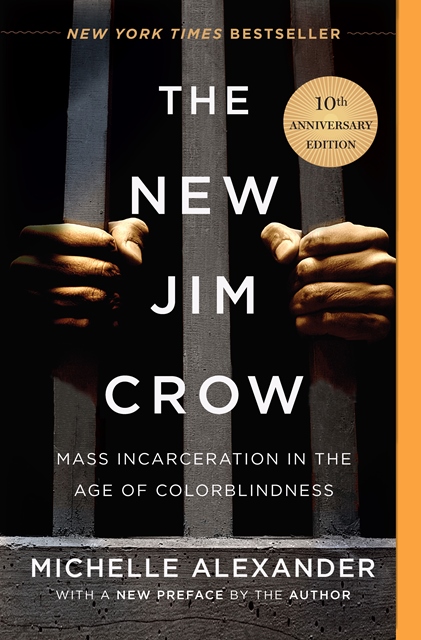 you haven’t read this book, you must. No matter what occupation or race you identify with, you have to be educated on racial injustice.) Alexander breaks down the origins of mass incarceration and explains just how much racism is alive and well today. It presented two truths to me: (1) everything I thought was okay was not; (2) there are pillars lodged in the system that is our country that play smaller yet more monumental roles in my life than I could have ever imagined. It felt as if I was stripped from my identity when in reality, I was shown it.
you haven’t read this book, you must. No matter what occupation or race you identify with, you have to be educated on racial injustice.) Alexander breaks down the origins of mass incarceration and explains just how much racism is alive and well today. It presented two truths to me: (1) everything I thought was okay was not; (2) there are pillars lodged in the system that is our country that play smaller yet more monumental roles in my life than I could have ever imagined. It felt as if I was stripped from my identity when in reality, I was shown it.
My initial reaction was anger. Of course I knew of the extensive history of racism, discrimination, and demanded societal erasure. I did not know that the very thing I was taught in school—how the criminal justice system and incarceration were fair and justified—was far from the truth. This led me to do more research on my own. I researched the extensive history of Black people here in America and all around the world. Gaining all this information invigorated and empowered me. It made me want to speak up against racism, which was new for me. I had never felt propelled to be more open in voicing my opinion in such a way before. I saw how much Black people have accomplished and how much of the world we know today would not come close in comparison if it were not for the people who lived, loved, sacrificed, and fought through life—in spite of all those odds stacked against them. Suddenly, I was a warrior.
Soon after, I grew hopeless with regards to the plight of the Black American people. I realized that we can only be so much here in America. The laws, statutes, beliefs, and values of the majority will not let us evolve in the light of God that we are supposed to.
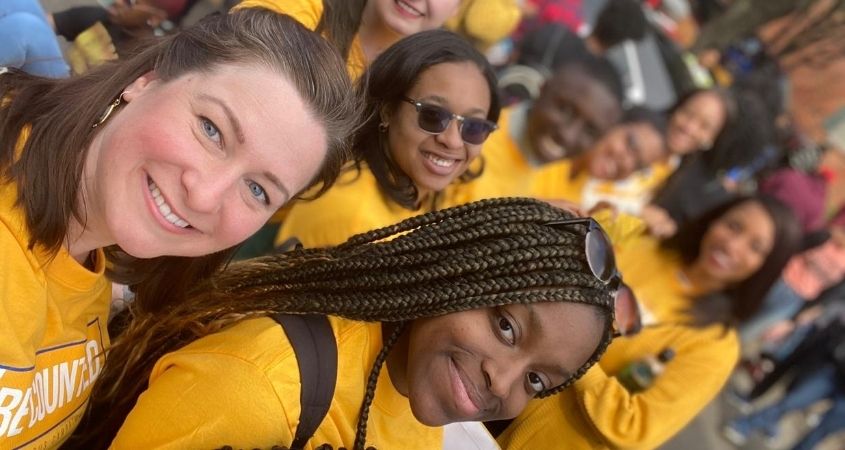
The author (center) with other members of the University of Detroit Mercy delegation at the march at Edmund Pettus Bridge.
I am a work study employee for the University Ministry Office at the University of Detroit Mercy. They are committed to doing service in the city of Detroit and elsewhere. Once I learned about the service immersion trip they orchestrated to Selma, Alabama and how it focused on the civil rights movement and racial justice, my intention was to reignite what I had lost. But, if I’m honest, I wasn’t expecting much change.
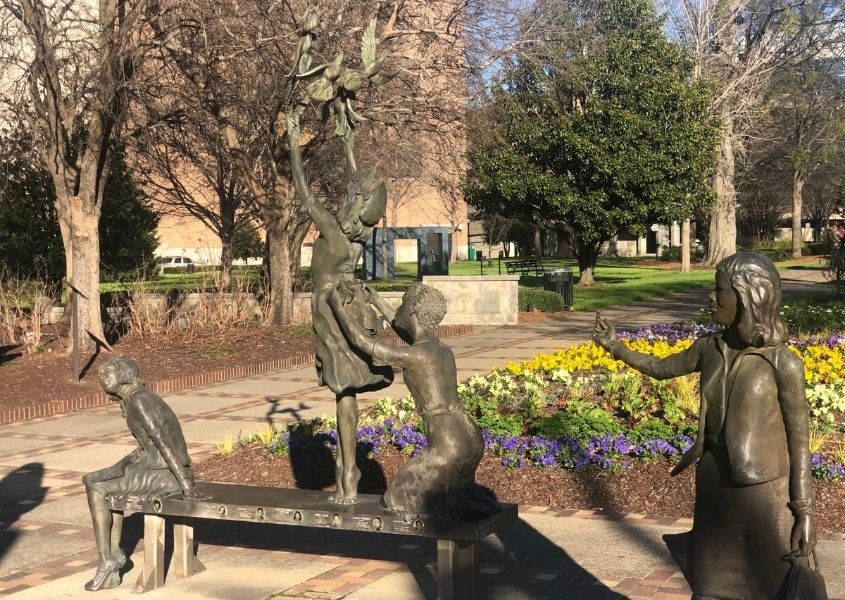
Statues of the four little girls killed in the 1963 bombing at the 16th Street Baptist Church in Birmingham, AL.
The first day of the trip was an amazing introduction. It was March 1, the anniversary of the first celebration of Bloody Sunday. Bloody Sunday marked when voting rights protesters in Selma tried to walk across the Edmund Pettus Bridge to gain voting rights at the capitol in Montgomery. They were met with city police and forced to return home.
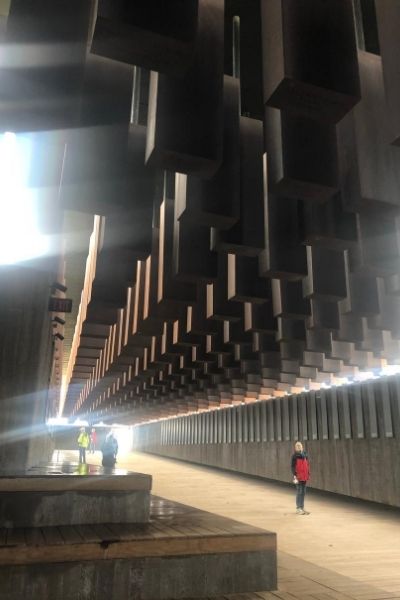
Statues with the names of those lynched at the National Memorial for Peace and Justice in Montgomery, AL.
Marching on that day with presidential candidates, Selma natives, and college students all the while being asked to represent the NAACP during the march was the climax of my trip. I sensed everyone’s 54-year-long dedication to a fight I lost hope for in my own community. Attending the awards dinner that was hosted by the Selma Center for Nonviolence, Truth and Reconciliation was humbling. Civil rights activists and those alike from all around the world were recognized for their contribution to the struggle. Seeing everyone come together to celebrate their great work towards nonviolence and racial justice was honorable. That day was a spark to an unexpectedly familiar feeling in me.
In the intermediate period of the trip, things began to shift. Our housing was compromised, we had not received necessary information regarding our volunteering, and other things. I found myself sitting on the deck at the Selma Center for Nonviolence, Truth and Reconciliation and remembered that I had not had a chance to reflect on my experience thus far. Watching the still water under the Edmund Pettus Bridge, I realized that I could only gain a valuable and impactful experience if I were like the water—flowing effortlessly through and around whatever is in its path, accepting the necessary adjustments. Water does not shape itself in a way it thinks it should be. It flows and knows. It doesn’t ponder. I kept this philosophy close to me as the trip continued.
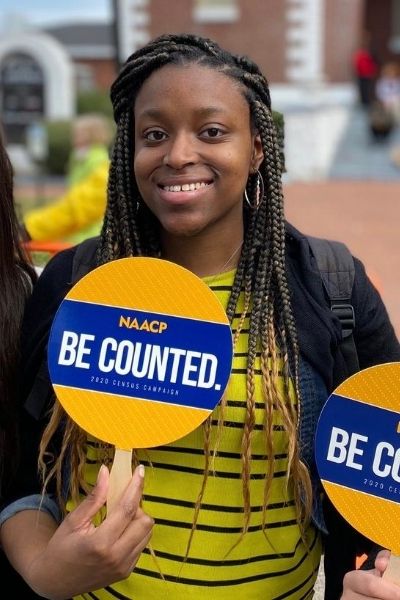
The author at the march for the anniversary of the first celebration of Bloody Sunday in Selma, AL
This unconsciously shaped the rest of the trip. My experiences were deeper and I was completely open to whatever remained for me. Overall, it was a whirlwind. It was a unique journey that made me feel the electricity of something more—whether good or bad. Inevitably, this feeling turned out to have a bigger meaning. It did not take me long to realize that the trip was destined. All of the experiences felt familiar, like I had been there before. God knew that I needed to experience the trip.
As of now, I have hope for my people. I believe, regardless of how the past and the present look, there is always hope for something better. The beauty of nature is that nothing is permanent, and that includes racism. We have to experience strife now, as my ancestors did in the march on Bloody Sunday and elsewhere, to pave a better path for my children and my children’s children. I am my ancestors’ wildest dreams and to them I owe everything. But we owe it to ourselves to invest and bestow all our faith into the youth. We are not the problem, but the solution.
LaRyn Ridgeway is a student at the University of Detroit Mercy studying developmental psychology. As a career, she would like to start a non-profit for at risk youth that focuses on their growth mentally, emotionally, and spiritually.

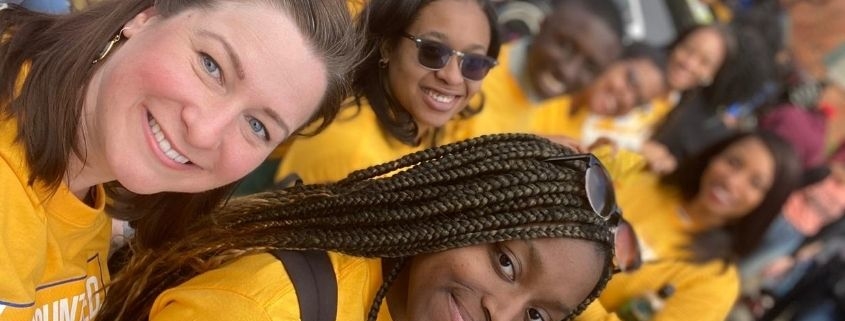
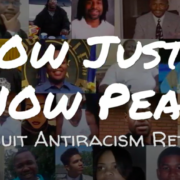
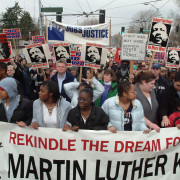
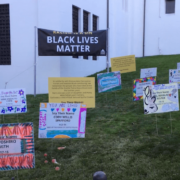
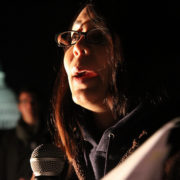
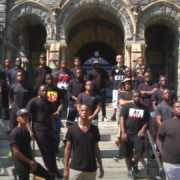
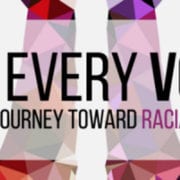

The beauty of nature is that nothing is permanent – Well said.
“We are not the problem” actually this is wrong, yes you has an individual may not be the problem but there are a small minority within your culture that inflict suffering amongst there own community and on to other races so the black community does highly contribute to most of the current problems not the white man. I can also teach you something that was told to me by a employee of mine originally from Nigeria, he told me 3 things “not all black people have ancestors that were slaves”, “Black people should learn more because we were the ones gathering people, it was us getting coins for blood, it was us that ruined ourselves” and I was shocked by the 3rd he said ” His ancestors were involved in the slave trade” at first I did not believe him but he has proof that is not currently on display at a museum it was removed 3 weeks after the protests started. White history is well documented and it isn’t perfect, it has never claimed to be all good but right or wrong does it give the right to be changed,pillaged and rewritten to suit another race, I’m talking about the 1619 project that was a crazy theory that America was built and found upon slavery which is not the case and rumors are this is already in the education system which is brainwashing future generations. Has somebody that uses wealth to help I will refuse to put money into that false ideology.God Bless
About the book and author, Michelle Alexander is a known civil rights advocate and is highly biased towards black people. Don’t get me wrong she is a very talented and intelligent black woman and her work shows this but if you sit down without been biased you can see the manipulation enclosed in the books. Again 1982 the war on drugs under Reagan, the black community at the time there was a drug pandemic and those that needed there next high went on to commit crimes this was the start I agree but if you commit a crime or take drugs regardless of skin color you deserve prison to get clean and reflect. Also the prison population growth from 300,000 to 2m this was expected due to the amout of drugs that was in the community and trying to compare to other countries is naive because of the population difference and is again a false comparison.Think about this rationally right , the black community have always had a drug problem has some people have a persona to carry on with this would be you gang members so if you live in poverty and haven’t got the means to pay for drugs you explore other avenues you either act like a middleman or become a criminal. There is no caste system, no conspiracy theory, no racism, and prisons are not owned by wealthy individuals picking up black men and putting them in prison. and that 13th is just a huge conspiracy theory nothing more I’m not going bore you with the reason why. Maybe stop committing crime and make the right choices it’s simple, and yes I could easily be a black man especially in the US has it contains the richest black men comparing to other countries so I would be a entitled and privileged black man in comparison elsewhere . I would love to see these white advocates spend a week with me has a white man in community neighborhoods which is violent without there car and police like I do and help those that people forget which I do everyday, you carry on holding your signs and taking valuable resources away from the people you don’t care about because protests are suffocating the black community.